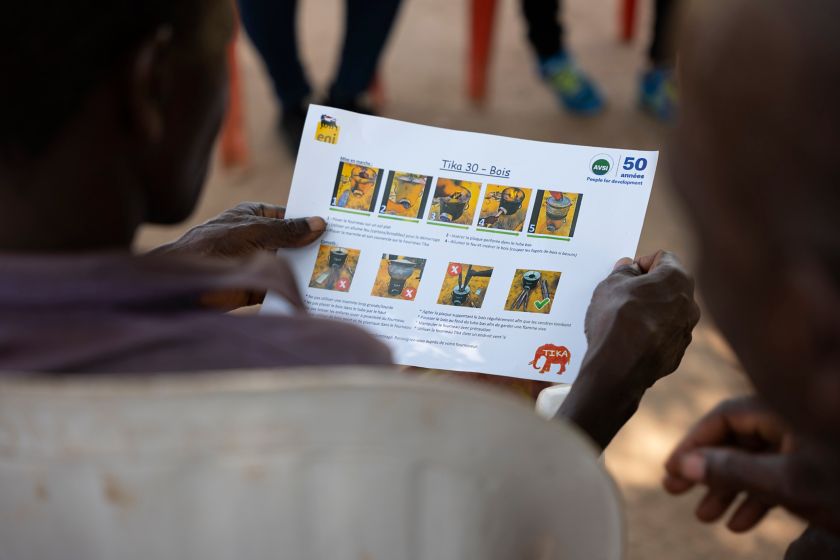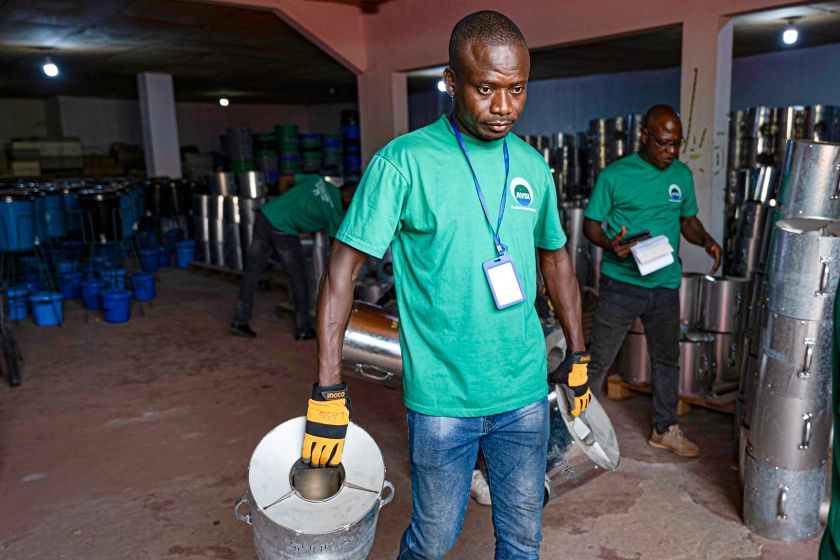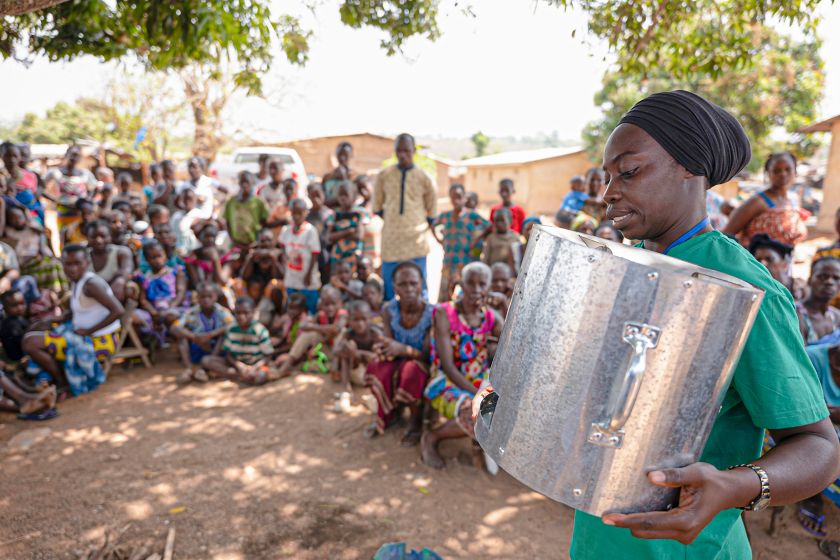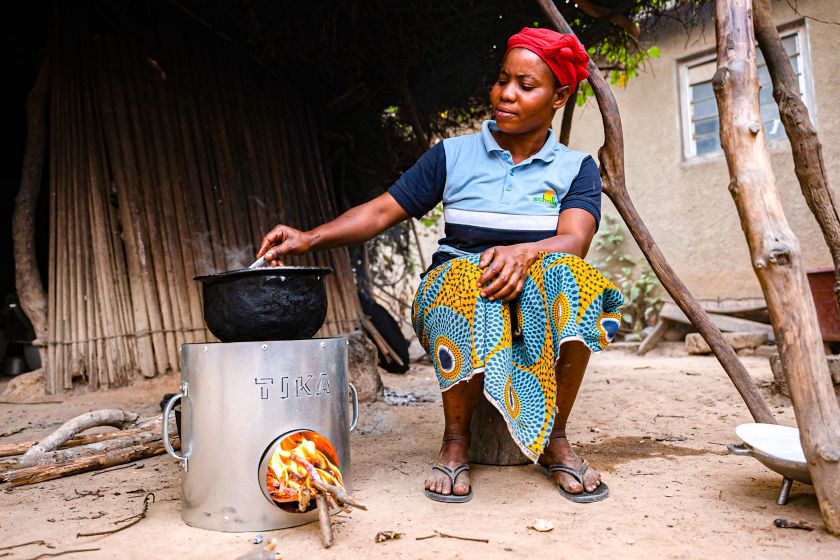Activity Type
Access to energy
Community health

Or , our new artificial intelligence tool.

In Côte d’Ivoire, we are developing Baleine, the country’s largest hydrocarbon discovery and Africa’s first net-zero project, which is crucial for domestic industrial development, energy transition and diversification of our traditional portfolio. Simultaneously, we have initiated carbon offset projects under Natural Climate Solutions (NCS) and applied technological solutions to help counterbalance the project's remaining emissions. The programme for access to improved cooking systems was the first project to be carbon offset launched. The project aims to reduce emissions associated with combustion, as well as to contribute to improving families’ quality of life by making traditional cooking methods more efficient and sustainable. With the start of production at the Baleine field, we are consolidating our role in the energy transition and in further facilitating access to energy in Côte d’Ivoire. We help the country to establish itself as a regional energy hub, not only for its electricity system, but also for oil and gas production to meet external and domestic demand respectively.
Côte d'Ivoire
2022 – present
Our initiative carbon offset promotes the dissemination of improved cooking systems in the most vulnerable communities in Côte d’Ivoire. The programme plans to reach 2.5 million people in seven years.
The cookers, which have high thermal efficiency, are entirely made in Côte d’Ivoire by a local workshop certified by the Clean Cooking Alliance, which, thanks to the project, has increased its production capacity and enabled the purchase of new machinery and the hiring of new workers.
Starting in 2025, we will launch initiatives to encourage a gradual shift from "improved" to "advanced" cooking systems. This will involve distributing induction hobs in urban settings and pyrolysis stoves in rural regions. These systems encourage the use of agricultural waste, including by-products from Eni's agri-feedstock supply chain, as biogenic fuel in line with circular economy principles.

The distribution of improved cookstoves instructions for use

Men at work at the factory

The distribution of cookers to the community

A cooking phase with the new cookers
Improved cooking stoves differ from traditional cooking systems, such as the three-stone hearth, in that although they are fuelled by wood and coal, they have high thermal efficiency that enables considerable savings on the amount of fuel needed. With their ability to reduce the amount of wood biomass used by up to 60%, the improved cookers help lessen the impact of cooking activities on deforestation in Côte d’Ivoire. Moreover, improved cookstoves save time spent collecting wood and money on purchasing charcoal, thereby reducing greenhouse gas emissions and combustion smoke, as well as improving the health of the people who use them.
One of the distinguishing features of the Eni model is the free distribution of cookstoves, in order to overcome any financial barriers. Furthermore, in order to promote the development of entrepreneurship and the community economy, Eni supports the local production of cooking systems, assessing manufacturers’ potential and helping to strengthen their technical and entrepreneurial skills, facilitating access to technology, capital and the market. Finally, the cookstoves are distributed through local and international organisations already present in the area, which guarantee a regular relationship with villages and communities, along with assistance provided to individual families, key elements in the work of the operators involved. The initiative’s success lies in raising awareness and accompanying beneficiary families in adopting these cooking systems.
of the project
reached by the initiative
distributed in 2024
Discover the stories, goals and results of our commitment to a just transition in the country.
Download the documentRead the stories, case studies and testimonials behind our contribution to a socially equitable energy transition in the Sustainability Report.
The interactive special
If you want to change topic, clear the chat and make a new query to receive more relevant results.
This will delete the question history.
If you want to change topic, clear the chat and make a new query to receive more relevant results. This will delete the question history.
Here you can find the full list of your queries.
The answers are generated by artificial intelligence, therefore they may contain inaccuracies. Please read the terms and conditions of use.

EnergIA is an innovative tool based on artificial intelligence capabilities, which can help you navigate the contents of eni.com, quickly finding answers to your questions. EnergIA can also perform a search on a specific topic, providing the most up-to-date data available, or it can invite you to delve deeper into a topic of your interest by suggesting links and specific readings. Start now!
EnergIA is an innovative tool based on artificial intelligence capabilities, which can help you navigate the contents of eni.com, quickly finding answers to your questions. Start now!
EnergIA (ener'dʒia) is a system based on Generative Artificial Intelligence.
Thanks to this technology, we can respond to your requests by querying the most relevant content and documents available on eni.com. (Note: financial documents from the last 12 months and press releases from the last 2 years are considered.)
Through EnergIA, you can delve into topics of interest and have a real-time window into the world of Eni.
If you wish to search for a specific document, press release or news, use the traditional search engine via the magnifying glass icon.
Like all systems that leverage Generative Artificial Intelligence, EnergIA may generate inaccurate or outdated responses. Always consult the sources that EnergIA proposes as the origin of the generated information.
If the system fails to find an exact match for the requested content, it still tends to provide a response.
If you find any inaccuracies in the provided response, please send us your feedback at the bottom of the page: it will be very helpful for us to improve.
Remember that the content generated by the system does not represent Eni’s official position. We therefore invite stakeholders to refer to their designated contacts for official statements: Press Office for journalists, Investor Relations for analysts and investors, Company Secretariat for shareholders etc..
EnergIA can understand questions posed in almost all languages, but we prefer to provide you with a response in English or Italian, the two languages available on eni.com. If you ask a question in Italian, the content on the site in Italian will be consulted. If you ask it in English or any other language, the content in English will be consulted. (Note: the language Eni uses for financial documents/content is predominantly English.)
If questions are formulated that violate the set security criteria, the system will not proceed with processing the response. Please remember not to send personal data.
By using this service, the users acknowledge that they have read and accepted the terms and conditions of use.
Search
EnergIA (ener'dʒia) is a system based on Generative Artificial Intelligence.
Thanks to this technology, we can respond to your requests by querying the most relevant content and documents available on eni.com. (Note: financial documents from the last 12 months and press releases from the last 2 years are considered.)
Through EnergIA, you can delve into topics of interest and have a real-time window into the world of Eni.
If you wish to search for a specific document, press release or news, use the traditional search engine via the magnifying glass icon.
Like all systems that leverage Generative Artificial Intelligence, EnergIA may generate inaccurate or outdated responses. Always consult the sources that EnergIA proposes as the origin of the generated information.
If the system fails to find an exact match for the requested content, it still tends to provide a response.
If you find any inaccuracies in the provided response, please send us your feedback at the bottom of the page: it will be very helpful for us to improve.
Remember that the content generated by the system does not represent Eni’s official position. We therefore invite stakeholders to refer to their designated contacts for official statements: Press Office for journalists, Investor Relations for analysts and investors, Company Secretariat for shareholders etc..
EnergIA can understand questions posed in almost all languages, but we prefer to provide you with a response in English or Italian, the two languages available on eni.com. If you ask a question in Italian, the content on the site in Italian will be consulted. If you ask it in English or any other language, the content in English will be consulted. (Note: the language Eni uses for financial documents/content is predominantly English.)
If questions are formulated that violate the set security criteria, the system will not proceed with processing the response. Please remember not to send personal data.
By using this service, the users acknowledge that they have read and accepted the terms and conditions of use.
A new window into Eni’s world, at your disposal. EnergIA is an innovative tool based on artificial intelligence capabilities, which can help you navigate the contents of eni.com, quickly finding answers to your questions.



